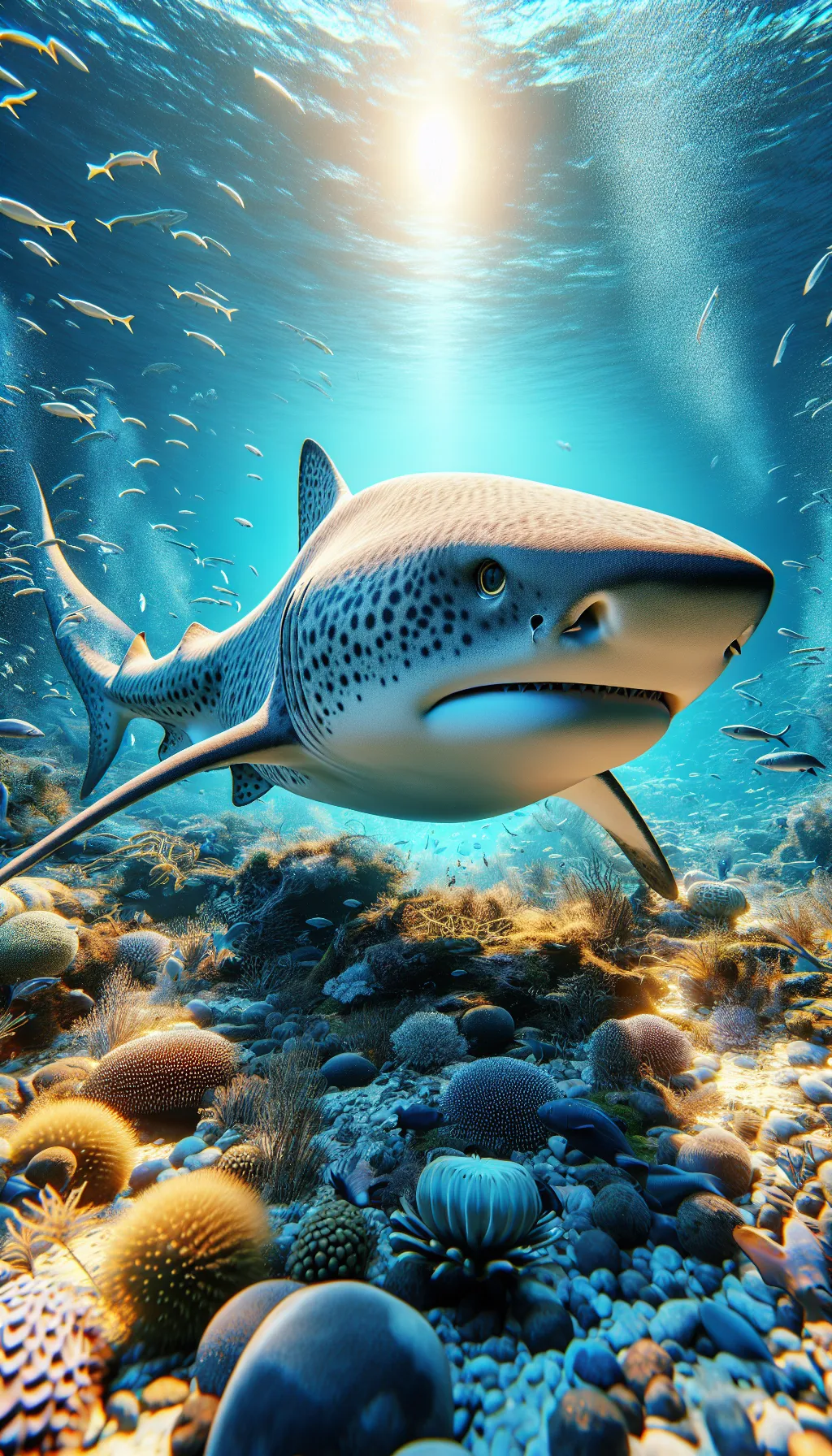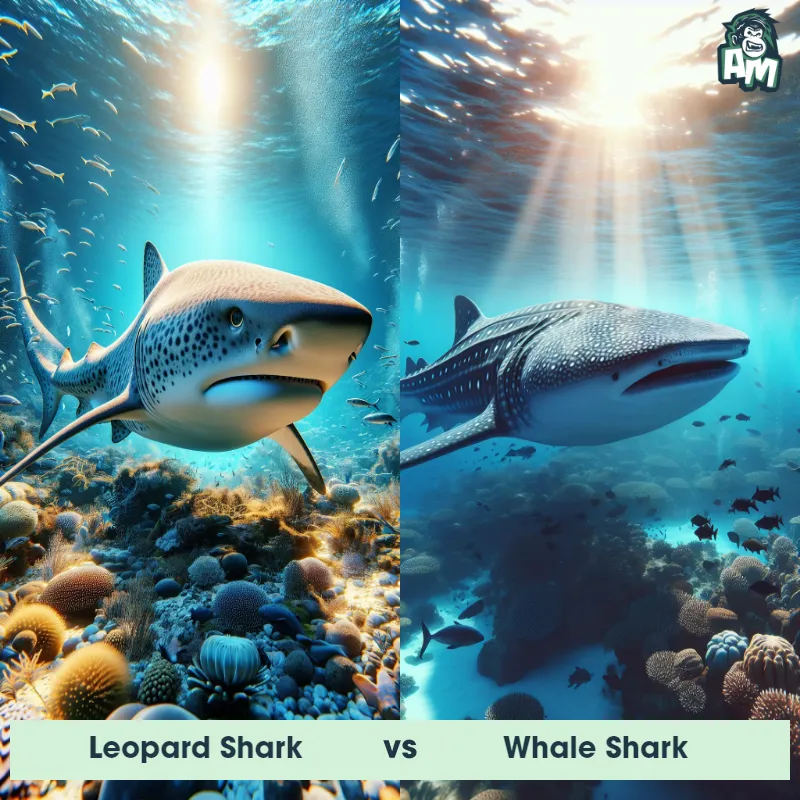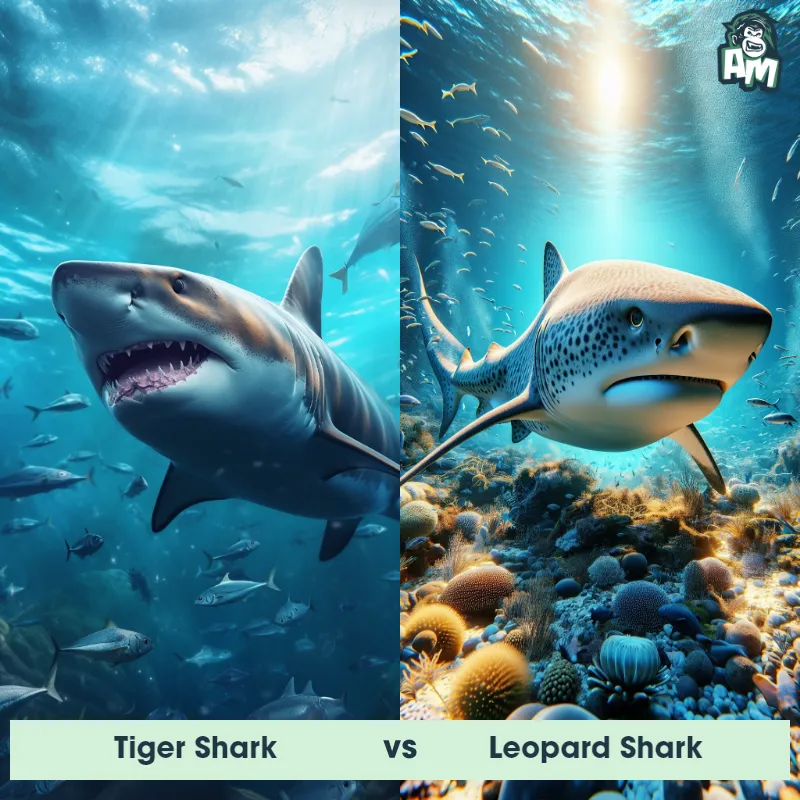The Leopard Shark
The Leopard Shark, also known as Triakis semifasciata, is a type of coastal shark found along the western coast of North America, from Oregon down to Baja California. These sharks have a slender body and can grow up to 5 to 6 feet in length. They have a distinctive pattern of dark brown or black spots and saddle-like markings, giving them their name. Leopard Sharks have a flattened head, elongated snout, and a mouth filled with small, sharp teeth. They are known for their graceful swimming style and are often found near sandy or muddy bottoms, estuaries, and kelp forests.

| Leopard Shark | |
|---|---|
| Size | Up to 5 feet long (1.5 meters) |
| Weight | Up to 40 pounds (18 kilograms) |
| Speed | 8 mph (13 km/h) |
| Key Strength | Swift, Agile Movements |
| Biggest Weakness | Relatively Docile |
| Scientific Name | Triakis semifasciata |
| Family | Triakidae |
| Habitat | Coastal Waters |
| Geography | Pacific Ocean |
| Diet | Crabs, Shrimp, Bony Fish, Seagrass |
| Lifespan | 20 years - 30 years |

The Leopard Shark
The Leopard Shark, also known as Triakis semifasciata, is a type of coastal shark found along the western coast of North America, from Oregon down to Baja California. These sharks have a slender body and can grow up to 5 to 6 feet in length. They have a distinctive pattern of dark brown or black spots and saddle-like markings, giving them their name. Leopard Sharks have a flattened head, elongated snout, and a mouth filled with small, sharp teeth. They are known for their graceful swimming style and are often found near sandy or muddy bottoms, estuaries, and kelp forests.
Fun Fact: Leopard Sharks are known for their remarkable ability to tolerate low oxygen levels in the water and can survive in waters where most other sharks would not be able to.
| Leopard Shark | |
|---|---|
| Size | Up to 5 feet long (1.5 meters) |
| Weight | Up to 40 pounds (18 kilograms) |
| Speed | 8 mph (13 km/h) |
| Key Strength | Swift, Agile Movements |
| Biggest Weakness | Relatively Docile |
| Scientific Name | Triakis semifasciata |
| Family | Triakidae |
| Habitat | Coastal Waters |
| Geography | Pacific Ocean |
| Diet | Crabs, Shrimp, Bony Fish, Seagrass |
| Lifespan | 20 years - 30 years |
Leopard Shark Matchups
We use AI to simulate matchups between the Leopard Shark and other animals. Our simulation considers size, strength, and natural predatory behaviors to determine the most likely outcome.

Can't find the Matchup you want?
Create Your Own MatchupLeopard Shark: Diet, Predators, Aggression, and Defensive Behaviors
What do Leopard Sharks eat?
Leopard Sharks are primarily bottom-feeders, feeding on a variety of small bony fishes, crabs, shrimp, octopus, and mollusks. They are known to hunt at night when their prey is most active, using their sharp teeth to grasp and crush their food before swallowing whole.
Do Leopard Sharks have any predators?
While Leopard Sharks are apex predators in their habitat, they still face predation from larger sharks, sea lions, and other marine mammals. In some areas, humans also pose a threat to Leopard Sharks through overfishing and habitat destruction.
Are Leopard Sharks aggressive?
Leopard Sharks are generally docile and non-aggressive towards humans. They are known to be shy and will usually swim away when approached. However, they may exhibit territorial behavior towards other sharks or competitors during feeding.
Do Leopard Sharks fight?
Leopard Sharks are not known for engaging in aggressive confrontations or fights with other animals. Their typical response to threats is to flee or use their agility to escape danger rather than engage in physical combat.
How do Leopard Sharks defend themselves?
In situations where they feel threatened, Leopard Sharks rely on their swift movements and camouflage to avoid detection. Their spotted pattern helps them blend in with their surroundings, making it harder for predators to spot them. If necessary, they may also use their sharp teeth for defense.
What is the biggest weakness of a Leopard Shark in a fight?
The biggest weakness of a Leopard Shark in a fight is their relatively small size compared to larger predators. While they can be agile and defensive, they may struggle to compete with larger, more powerful predators in a physical confrontation. Their best defense is often to avoid conflict altogether through evasion and camouflage.
Fun Fact: Unlike most sharks, Leopard Sharks are not aggressive towards humans and are considered to be docile creatures. They rarely pose a threat, making them popular among divers and snorkelers.
Fun Fact: Leopard Sharks are known for their unique reproductive behavior. Females store sperm from multiple partners and produce eggs over an extended period. This reproductive strategy, known as polyandry, allows for greater genetic diversity within the offspring and ensures successful reproduction even when males are scarce.












